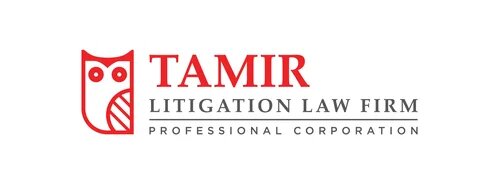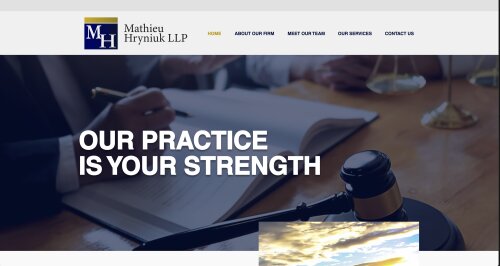Best Private Equity Lawyers in Canada
Share your needs with us, get contacted by law firms.
Free. Takes 2 min.
Or refine your search by selecting a city:
List of the best lawyers in Canada
About Private Equity Law in Canada
Private Equity (PE) in Canada refers to investments made in private companies or the acquisition of public companies that result in their delisting from stock exchanges. These investments are typically made by PE firms, venture capital funds, or individual investors interested in growing, restructuring, or eventually selling these businesses for a profit. The market in Canada is robust and active, with a complex legal framework governing how investments are structured, negotiated, and managed. Private Equity law encompasses various areas including securities regulation, mergers and acquisitions (M&A), tax planning, contracts, and compliance with federal and provincial regulations.
Why You May Need a Lawyer
Legal support is crucial in Private Equity transactions due to the significant financial stakes, complex deal structures, and strict regulatory requirements. Common reasons for seeking a lawyer include:
- Structuring and negotiating buyout deals, merger agreements, or joint ventures
- Drafting and reviewing investment agreements and shareholder agreements
- Ensuring compliance with securities laws and disclosure requirements
- Conducting due diligence on target businesses
- Managing cross-border transactions and understanding international legal implications
- Advising on tax structuring and implications of deals
- Dispute resolution between investors, partners, or portfolio companies
Because Private Equity transactions often involve multiple parties, jurisdictions, and significant capital, having legal guidance helps protect your interests and ensures compliance at every stage.
Local Laws Overview
Canadian Private Equity transactions are governed by a mix of federal and provincial laws. Key aspects include:
- Securities Regulation: The buying, selling, or exchanging of private company shares is regulated by provincial securities commissions. Disclosure obligations and exemptions apply to private placements and investment funds.
- Mergers and Acquisitions (M&A) Law: Acquiring or merging with existing businesses involves compliance with competition laws and regulations under the Competition Act and, in some cases, the Investment Canada Act.
- Tax Laws: Tax structuring is a vital component, with the Income Tax Act governing income derived from Private Equity investments, capital gains, and cross-border tax implications.
- Corporate Law: Provinces have their own business corporation statutes (such as Ontario’s Business Corporations Act), setting rules for company formation, governance, and director duties.
- Employment and Labour Laws: When acquiring businesses, it's critical to understand obligations towards employees, including potential liabilities or collective agreements that may transfer after a deal.
- Foreign Investment Regulation: The Investment Canada Act requires government review of certain large or sensitive foreign investments.
Frequently Asked Questions
What types of businesses are commonly targeted by Private Equity in Canada?
PE firms typically target private mid-market companies with growth potential, distressed businesses requiring turnaround, or public companies that can be taken private for restructuring and future sale.
Is regulatory approval required for every Private Equity transaction?
Not all deals need government approval. However, transactions exceeding certain monetary thresholds, involving public companies, or sectors with foreign ownership limits require review under securities laws, competition laws, or the Investment Canada Act.
How does due diligence work in Private Equity?
Due diligence is a detailed investigation conducted before making an investment. It covers legal, financial, operational, and regulatory aspects to identify risks and verify key information about the target business.
Are there restrictions on foreign Private Equity investment in Canada?
Yes. The Investment Canada Act sets out rules and thresholds for foreign investments to ensure they benefit Canada. Some sectors, like telecommunications or resources, may have specific restrictions.
What are the common structures used for Private Equity funds?
Most PE funds in Canada are structured as limited partnerships, where general partners manage the fund and limited partners provide capital while enjoying limited liability.
How are Private Equity gains taxed in Canada?
Profits from PE investments may be taxed as capital gains or business income, depending on deal structure and circumstances. Cross-border investments introduce additional tax considerations.
What is a management buyout?
A management buyout occurs when a company’s existing managers purchase the business, usually with the backing of PE investors, to take control and operate independently.
What legal documents are essential in a Private Equity transaction?
Key documents include the letter of intent, purchase and sale agreements, shareholder agreements, partnership agreements, and documentation for regulatory filings.
Can disputes arise after a Private Equity deal closes?
Yes. Disputes may arise over earn-outs, financial representations, breaches of contract, or post-closing obligations. Many agreements include dispute resolution mechanisms such as arbitration or mediation.
How can I find a qualified Private Equity lawyer in Canada?
Look for lawyers or firms specializing in corporate law, mergers and acquisitions, or securities law with direct experience in Private Equity transactions. It is wise to request references and review case studies or client testimonials.
Additional Resources
If you need more information about Private Equity in Canada, consider these helpful organizations and government bodies:
- Canadian Venture Capital and Private Equity Association (CVCA) - Industry guidance and events
- Provincial Securities Commissions - Regulatory information for your province or territory
- Competition Bureau Canada - Information on merger and competition law compliance
- Investment Canada Act Division, Innovation, Science and Economic Development Canada - Guidance on foreign investment rules
- Canada Revenue Agency (CRA) - Resources on tax treatment for PE transactions
Next Steps
If you need assistance with a Private Equity transaction or have legal questions, consider these steps:
- Clarify your goals and the specific nature of your investment or transaction
- Gather all relevant documents such as company financials, contracts, and corporate records
- Reach out to a lawyer or law firm with experience in Private Equity and related fields
- Prepare a list of questions or concerns to discuss during your initial consultation
- Stay informed about regulatory requirements or deadlines that may impact your deal
Working with a knowledgeable legal advisor from the outset helps safeguard your investment, streamlines complex transactions, and reduces the risk of costly errors.
Lawzana helps you find the best lawyers and law firms in Canada through a curated and pre-screened list of qualified legal professionals. Our platform offers rankings and detailed profiles of attorneys and law firms, allowing you to compare based on practice areas, including Private Equity, experience, and client feedback.
Each profile includes a description of the firm's areas of practice, client reviews, team members and partners, year of establishment, spoken languages, office locations, contact information, social media presence, and any published articles or resources. Most firms on our platform speak English and are experienced in both local and international legal matters.
Get a quote from top-rated law firms in Canada — quickly, securely, and without unnecessary hassle.
Disclaimer:
The information provided on this page is for general informational purposes only and does not constitute legal advice. While we strive to ensure the accuracy and relevance of the content, legal information may change over time, and interpretations of the law can vary. You should always consult with a qualified legal professional for advice specific to your situation.
We disclaim all liability for actions taken or not taken based on the content of this page. If you believe any information is incorrect or outdated, please contact us, and we will review and update it where appropriate.
Browse private equity law firms by city in Canada
Refine your search by selecting a city.












